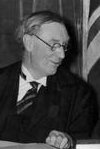Portal:Cumbria/Selected article/7
William Norman Birkett, 1st Baron Birkett, PC (6 September 1883 – 10 February 1962), was a British barrister, judge, politician and preacher who served as the deputy British judge during the Nuremberg Trials.
Birkett received his education at Barrow-in-Furness Higher Grade School. He was a Methodist preacher and a draper before attending Emmanuel College, Cambridge, in 1907, to study theology, history and law. Upon graduating in 1910 he worked as a secretary and was called to the Bar in 1913.
Declared medically unfit for military service during World War I, Birkett used the time to make up for his late entry into the legal profession and was appointed a King's Counsel in 1924. He became a criminal defence lawyer and acted as counsel in a number of famous cases including the second of the Brighton trunk murders. A member of the Liberal Party, he sat in Parliament for Nottingham East twice, first in 1923 and again in 1929.
Despite refusing appointment to the High Court of Justice in 1928, he was offered the position again in 1941 and accepted, joining the King's Bench Division. In 1945 he served as the alternate British judge at the Nuremberg trials, and he was made a privy counsellor in 1947. He joined the Court of Appeal in 1950 but retired in 1956 when he had served for long enough to draw a pension. From 1958 he served in the House of Lords, and his speech against a private bill in 1962 (the Bill sought to convert the Cumbrian lake Ullswater into a reservoir) saw it defeated by 70 votes to 36, two days before he died on 10 February 1962.
Described as "one of the most prominent Liberal barristers in the first half of the 20th century" and "the Lord Chancellor that never was", Birkett was noted for his skill as a speaker, which helped him defend clients with almost watertight cases against them. As an alternate judge, Birkett was not allowed a vote at the Nuremberg Trials, but his opinion helped shape the final judgment. During his tenure in the Court of Appeal he oversaw some of the most significant cases of the era, particularly in contract law, despite his avowed dislike of judicial work. (Full article...) (more...)

